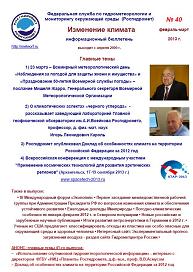| Climate Doctrine of the Russian Federation |
 |
 |
 |
|
Climate Doctrine of the Russian Federation has been developed in accordance with the request of the President of the Russian Federation of 09.04.2008 and the Government of the Russian Federation of 18.04.2008.
Development of policies and measures on climate is the obligation of countries to the UNFCCC. Article 4 of the UNFCCC: "All parties ... formulate, implement, publish and regularly update national ... programs containing measures to mitigate climate change and measures to facilitate adequate adaptation to climate change."
At the turn of XX and XXI centuries observed global warming has gone beyond allowing to consider the problem of climate change as a purely scientific. There is good reason to believe that anthropogenic greenhouse gases accumulating in the atmosphere since the mid XIX century are exerting a significant influence on climate. It is highly probable that the human influence on climate will be enhanced during the XXI century. Climate-related increase of severe weather events (typhoons, tornadoes, heat waves and cold waves, droughts, floods, etc.), the increase in surface temperature, reducing the size and weight of the ice cover the land and the polar seas, melting permafrost, rising sea levels, changes in river flows, changes in distribution of water resources, changes in terrestrial and marine flora and fauna will have (and already has) the effect for the XXI century for all kinds of economic activity, living conditions and health on all continents. Due to the size of its territory and its location (a large part of the Russian Federation, located in the polar region, refers to the area of the maximum of the observed and projected climate change), the diversity of the possible implications for economic activity, human health, flora and fauna, the Russian Federation is one of the key subjects of international relations on global climate change. April 23, 2009 Presidium of the Russian Government approved the Climate Doctrine of Russia submitted by the Minister of Natural Resources and Ecology Y.Trutnev. The Doctrine was prepared by experts of Roshydromet and Russian Academy of Sciences (RAS) involving several ministries and agencies concerned.
December 17, 2009 President of Russia signed the Climate Doctrine of the Russian Federation. The Climate Doctrine is the founding document for the adoption of internal and external political, economic decision-making and planning for sustainable development of Russia.
Goals of the Climate Doctrine The climate policy is defined by the objectives that facilitate the achievement of its strategic goal and are achieved with due consideration of the specific features of the Russian Federation in the context of climate change.
The legal basis of this Doctrine includes the Constitution of the Russian Federation, federal laws, standard legal acts issued by the President of the Russian Federation and the Government of the Russian Federation, the United Nations Framework Convention on Climate Change of May 9, 1992, and other international treaties signed by the Russian Federation, including those on environmental issues and sustainable development.
The main provisions Climate change is one of the most important international problems of the XXI Century, which is beyond the scope of a scientific problem and represents a complex interdisciplinary problem, encompassing environmental, economic and social aspects of sustainable development of the Russian Federation.
The unprecedented high rate of global warming observed in recent decades is a particular concern. Modern science gives all the more compelling reasons to prove that human activities, related primarily to emissions of greenhouse gases from burning fossil fuels, have a significant impact on the climate.
Climate change is various and it appears in change in frequency and intensity of climate anomalies and extreme weather events. During the XXI century the probability of acceleration of observable climate changes is high.
Expected climate change will inevitably affect the lives of people, flora and fauna in all regions of the planet and some of them will become a real threat to the well-being and sustainable development.
These factors determine the need to address climate change as one of the key factors of long-term security of the Russian Federation and highlight the problem of global climate change in its national and international dimensions. It is one of the priorities of Russia's policy. The impacts of climate change are observed on global, regional, sub regional and national levels. Global climate change poses such situation to the Russian Federation (with the size of its territory, geographical location, the exceptional diversity of climatic conditions, economic structure, demographic and geopolitical interests), which suggests the need for early formation of a comprehensive and balanced approach of the country to climate change and related issues at basis of a comprehensive scientific analysis of environmental, economic and social factors.
Stages in the development of the Climate Doctrine of the Russian Federation · 2005 Research of Main Geophysical Observatory of Roshydromet "Development of proposals on the concept of the Climate Doctrine of the Russian Federation"
Full text of Climate Doctrine is placed on web-site of the President of the Russian Federation
|





